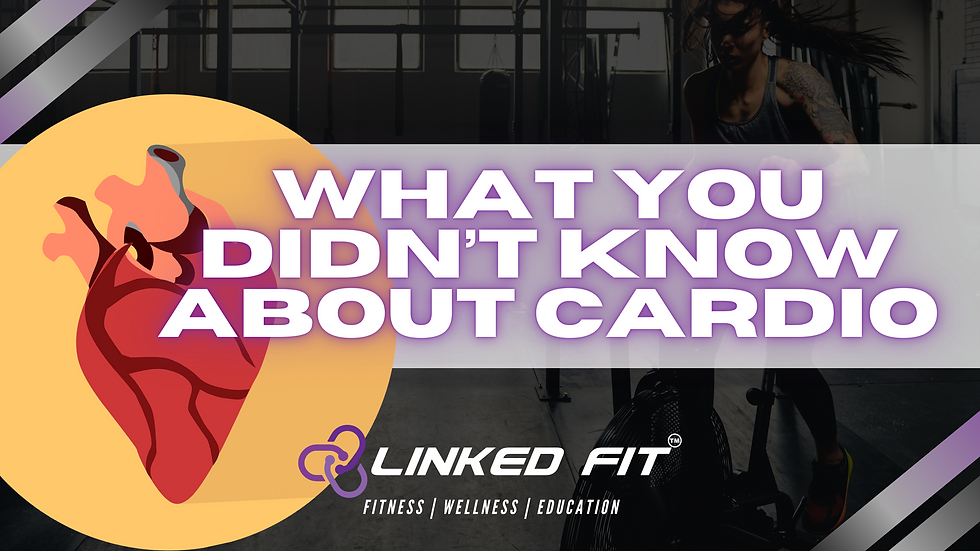Breakfast 101
- Linked Fit

- Nov 1, 2018
- 3 min read
Updated: Mar 8, 2022
Ahhh breakfast!

If you’re like me, you love breakfast! It’s personally my favorite meal of the day! I could eat breakfast food for lunch and dinner. I love it that much! I’ll ask you, what is breakfast food? What comes to mind when you think of breakfast? Bagels, croissants, bacon, sausage, pastries, eggs, and coffee? Sounds good, right, but is it the healthiest? Maybe not, but there is a way to upgrade your breakfast to become more healthy! After all, they say breakfast is the most important meal of the day.
In America, we find ourselves making sweet, convenient breakfasts meals, or in fact, skipping breakfast altogether. This is mainly due to the fact that we are always on the go. The average American spends about 35 minutes on meal prep a day. Do the math, that doesn’t leave much time for breakfast.
Fujiware and Nakata state that individuals who skip breakfast have a significantly higher incidence of a self-perception of poor general health. The females in this study had higher correlations with reproductive issues when they skipped breakfast. When it comes to strength and performance, Cui et al, provided supporting evidence that breakfast consumption is significantly associated with higher grip strength and faster sprint times in both genders. When it comes to macronutrients, Hall et al found that individuals that skip breakfast have a probability of low dietary quality consumption. Therefore, eat breakfast!
About 90% of Americans believe that eating breakfast is a good idea, but more than half of them do not actually eat breakfast. There are many reasons why people skip breakfast, but in the long run, it doesn’t seem to be an efficient and effective practice for overall health and wellness. Research supports that people who skip breakfast are likely to be obese or overweight. Who is more likely to skip breakfast? Individuals between the ages of 12 to 29, lower-income, and also, African Americans. Eating higher calories and less nutrient-dense foods have been seen with individuals that eat breakfast at home or out. Examples of typical breakfast meats include bacon, sausage, cereals, bars, bagels, and pasties. Fast food breakfasts are on the rise and the fast-food chain revenues are in the billions! With that said, make appropriate choices.

There’s no question, the typical American breakfast has reduced nutritional qualities when compared to other countries. Therefore, partially explains the reason that 60 to 70% of Americans are overweight or obese and the increase of cardiovascular disease and other co-morbidities. Of course, breakfast choices are only part of the problem! Breakfast is a good place to start developing healthy habits. Other countries are consuming foods that have been shown to improve the qualities of health and wellness, by eliminating processed and energy-dense foods.
I am not saying that skipping breakfast is going to make you overweight but the choices that follow skipping breakfast can lead to unhealthy habits. Sure, if you are going to eat these overly processed and energy-dense food, skip breakfast. It’s the unhealthy options that can trigger you to go down a path of more unhealthy habits. Therefore, I want you to understand that breakfast can be a great way to start your day on the right foot. It’s a chance to adopt positive and healthy habits! Incorporating healthy options first thing in the morning will only just set you up for success!
It’s also important to listen to your body. Some people can do really well without eating breakfast, while others do not. You have to do what is right for you. Listen to your body! As always, it’s about providing balance, staying positive, and making better choices throughout our lives. A big step is to listen and form patterns in regard to your internal hunger cues.

Benefits to a Healthy Breakfast:
Decreased body fat
Decreased both chronic and non-communicable diseases
Better retention and learning
Improved mood
More energy
Better muscle preservation
Increased strength
Able to make better food choices throughout the day
Decreased cholesterol
Improved digestive responses
Better and more stable blood sugar levels
Here are some things to keep in mind when putting together better breakfasts.
Set time to actually side down and eat breakfast.
This might mean prepping the day before or waking up a few minutes earlier
Eat your food slowly.
Include a protein source, eggs are usually the go-to but don’t be afraid to step out of the norm.
Add veggies at breakfast.
Add whole grains like quinoa and oats.
Eat until you are about 80% full.
Prioritize fresh, whole foods.
Develop a routine and stick to that routine
References:
Cui, Y, Zhang, W, Gong, Q, Chen, Y, Chen, S, & Wu, Z (2018) Frequency of breakfast and physical fitness among Chinese college students. American Journal of Health Behaviors, 42(1), 156-162.
Fujiwara, T, & Nakata, R (2010) Skipping breakfast is associated with reproductive dysfunction in post-adolescent female college students. Appetite, 55(3), 714-717.
Hall, L, Tejada-Tayabas, L M, & Monarrez-Espino, J (2017) Breakfast skipping, anxiety, exercise, and soda consumption are associated with diet quality in Mexican college students. Ecology of Food and Nutrition, 53(3), 218-237.



Comments